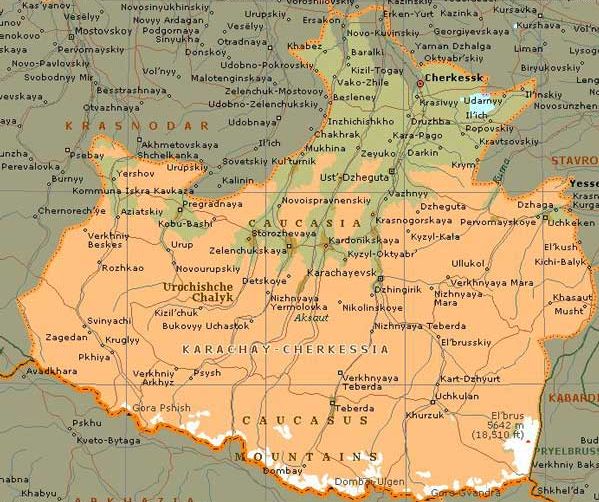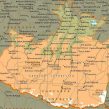
Is Karachaevo-Cherkessia the Next North Caucasus Hot Spot?
Publication: Eurasia Daily Monitor Volume: 8 Issue: 43
By:

The surprise visit of Russian President Dmitry Medvedev to Vladikavkaz on February 22, 2010 (www.rian.ru/politics/20110222/337349132.html) clearly shows how complicated the situation is in the region. The choice of cities in the North Caucasus where the head of the Russian state can be safely hosted has narrowed down to the capital of North Ossetia-Alania. For personal safety reasons, there is no other city in the neighborhood that could be recommended to the Russian leader for holding an emergency meeting of the heads of the national republics of the North Caucasus Federal District, including Chechnya, Ingushetia, Dagestan, Kabardino-Balkaria and Karachaevo-Cherkessia. It is therefore not surprising that upon arriving in the region, Medvedev lashed out at those who, in his view, were the primary reason he was forced to make an unscheduled trip to the erstwhile resort area, which has long become a battlefield as a result of the Kremlin’s policy vis-à-vis the armed opposition.
For nearly 12 years, Moscow has argued that there is no fighting going on in the region, but, at the same time, has had to keep the best combat-ready units of its army in this perilous part of the Russian Federation. Today, Dmitry Medvedev is clad in the skin of Vladimir Putin of the beginning of 2000, when the latter was president. Medvedev’s language has become tougher and even rude, and he is clearly trying to present himself as a strong man in the eyes of Russians, who apparently still prefer Putin (www.levada.ru/press/2011022109.html). Referring to North Caucasus jamaats and their leaders, Medvedev said: "There are just dirty, smelly caves where they hide. And they are no emirs but ugly beasts who kill children and women.” He almost word for word repeated what Putin said in February 2005 (www.politcom.ru/article.php?id=731). The only difference is that Medvedev never will be what Vladimir Putin was in the early 2000s, so his attempts to mimic his predecessor seems rather comical.
Medvedev’s trip to the North Caucasus was related to the actions perpetrated by rebels on February 18, when they shot tourists from Moscow, bombed a cable car line at ski resort, and engaged in a series of attacks on the outskirts of Nalchik, the capital of Kabardino-Balkaria. But the Russian president could not even imagine what militants had in mind to mark his arrival in and departure from the region. On the evening of February 25, a few days after Medvedev left for Moscow, several rebel units opened fire and attacked government facilities simultaneously in different parts of Nalchik (www.caucasustimes.com/article.asp?id=20769), firing rocket-propelled grenades at the local Federal Security Service (FSB) building and an FSB hotel near the house where Arsen Konokov, the head of Kabardino-Balkaria, lives, and at security checkpoints in the suburbs of the city (www.rian..ru/infografika/20110225/339006062.html). The operation was noteworthy despite the fact that it left only a few security forces officers wounded and that the rebel fighters suffered no losses at all. The importance of the operation lies not in the casualties but in the fact that it was conducted in the capital city of the republic, not by a lone gunman or a single militant group, but as a coordinated and well-considered military operation whose purpose was to demonstrate that the rebels are capable of striking anywhere in Kabardino-Balkaria. This is the first such serious operation carried out by militants of the Kabardino-Balkaria Jamaat, and probably not the last one.
A day after the attack, the authorities introduced an counter-terrorist operation (KTO) regime in several districts of Nalchik and the surrounding areas (https://kabardino-balkaria.kavkaz-uzel.ru/articles/181620/). For the duration of the operation, tourists were asked to refrain from coming to the republic, inflicting a major toll on the regional economy. In response to the measures taken by the authorities, local residents, worried they could lose even the small revenues they receive from tourism, asked the Russian federal government not to close the republic to visitors. But after the announcement was made by Russia’s top leaders, it is unlikely there will be any significant flow of tourists to the region for the foreseeable future (www.govoritmoskva.ru/news.php?id=68441).
The actions taken by the Kabardino-Balkaria Jamaat since Asker Dzhappuev became its leader have forced Moscow to reconsider its approach toward this republic and to put it on a par with Chechnya, Dagestan and Ingushetia. For the first time, residents of Kabardino-Balkaria witnessed how Russia’s military aviation bombed mountainous areas of their republic, supported on the ground by infantry fighting vehicles and armored personnel carriers. This means that the population finds itself involved in military actions, which often leads to protests among the locals – not against the militants, but against the policy of the Russian government.
The reputation of Arsen Konokov has inevitably suffered as well. The recent rebel actions could become the pretext for his removal, especially against the backdrop of Karachaevo-Cherkessia, the more peaceful region next door to Kabardino-Balkaria, where Boris Ebzeyev recently submitted his resignation as head of the republic (https://lenta.ru/articles/2011/02/27/ebzeev/).
Ebzeyev left his post without being able to establish his own team. Prior to becoming the leader of Karachaevo-Cherkessia, he served as a member of the Russian Constitutional Court and, as a competent and honest person, it was predicted he would enjoy political longevity. Nonetheless, he resigned “voluntarily.” According to an anonymous source in the Kremlin, Ebzeeyv did not fulfill the hopes of the Kremlin’s political technologists (www.regnum.ru/news/1378433.html). And it is not surprising. Admired by all of the Karachay, Ebzeyev could not even bring together the local assembly for an urgent meeting and was unable to build a power vertical.
Rashid Temrezov was selected as the new head of the republic. Born in 1976, he worked as the head of the Management of Federal Roads in Karachaevo-Cherkessia and was a member of the local parliament. His appointment as Karachaevo-Cherkessia’s young new leader raises a lot of questions about a lingering influence of the former president of Karachaevo-Cherkessia, Mustafa Batdyev, who left his post following a scandal involving the corruption and criminality of close family members. Batdyev’s shadow influence behind the scenes will lead young Temrezov to rule in the old style, characterized by the clan-based distribution of posts in the local government. But the new leader faces many problems. Given the rapidly growing influence and audacity of the neighboring Kabardino-Balkaria Jamaat and its leader, Karachaevo-Cherkessia may well become the next hot spot in the North Caucasus. That is, the resurrection of the Karachay Jamaat might be in the offing. It is worth mentioning that it was one of the most daring jamaats in the North Caucasus in the early 2000s.
Meanwhile Chechnya’s Ramzan Kadyrov has also decided to put an end to the jamaats, which are detrimental to the image of "a peaceful and prosperous Chechnya" he aspires to promote. Throughout February, there were special operations in the mountainous parts of Chechnya and along the border with Ingushetia, in which six alleged rebels were liquidated. Since the number of militants killed is not large, the situation will hardly see any fundamental change. Moreover, there cannot be a change in one single area while jamaats are carrying out fierce operations against the government in practically all the republics of the North Caucasus, with Dagestan and Ingushetia being the most active.
The Russian president may have the right to prohibit the use of terms related to the armed opposition, but this does not mean that the armed resistance in the North Caucasus will simply disappear.
Medvedev might do better by trying to seek common ground with the demands of the armed opposition, which could give one greater hope for the future of the North Caucasus.




